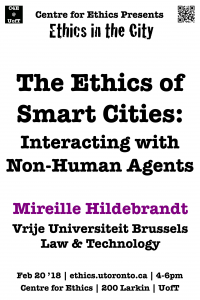 In her book on Smart Technologies and the End(s) of Law, Mireille Hildebrandt sketches the contours of a new landscape, animated by all kinds of machine agency. She calls the fusion of online and offline worlds “the Onlife World,” highlighting that the boundaries between on- and offline are becoming increasingly artificial: we have to make them to retain some of our personal space. Being human in a hyperconnected world was the subtitle of the “Onlife Manifesto,” that was written by a group of European philosophers, neuroscientists, psychologists, lawyers and experts in artificial intelligence. In her lecture, Hildebrandt will employ the work of Julie Mehretu to discuss the impact of a transformed cityscape that confronts citizens with the effects of hyperconnectivity, big data and predictive analytics at the level of municipal policies. The question will be what kind of humans we may become when ‘living with algorithms’ is the new normal, and how we can learn to shape our algorithmic environment in the Onlife World without succumbing to idealistic or cynical portrayals of the upcoming smart cityscape. This talk will revisit a presentation Hildebrandt gave at art centre Stroom in The Hague.
In her book on Smart Technologies and the End(s) of Law, Mireille Hildebrandt sketches the contours of a new landscape, animated by all kinds of machine agency. She calls the fusion of online and offline worlds “the Onlife World,” highlighting that the boundaries between on- and offline are becoming increasingly artificial: we have to make them to retain some of our personal space. Being human in a hyperconnected world was the subtitle of the “Onlife Manifesto,” that was written by a group of European philosophers, neuroscientists, psychologists, lawyers and experts in artificial intelligence. In her lecture, Hildebrandt will employ the work of Julie Mehretu to discuss the impact of a transformed cityscape that confronts citizens with the effects of hyperconnectivity, big data and predictive analytics at the level of municipal policies. The question will be what kind of humans we may become when ‘living with algorithms’ is the new normal, and how we can learn to shape our algorithmic environment in the Onlife World without succumbing to idealistic or cynical portrayals of the upcoming smart cityscape. This talk will revisit a presentation Hildebrandt gave at art centre Stroom in The Hague.
Law and Technology, Vrije Universiteit Brussels
Computing & Information Sciences, Radboud University Nijmegen
Tue, Feb 20, 2018
04:00 PM - 06:00 PM
Centre for Ethics, University of Toronto
Rm 200, Larkin Building
